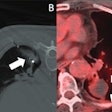A new rectal surgery technique may do a better job than colonoscopy for removing large rectal polyps. A hybrid between transanal endoscopic microsurgery and single-port laparoscopy, the system can remove polyps of any size, even obstructing lesions, with less pain and scarring.
Called transanal minimally invasive surgery (TAMIS), the procedure could potentially be used to remove large rectal polyps detected at screening virtual colonoscopy, though her group has not attempted it, said Dr. Elisabeth McLemore, assistant professor of surgery at the University of California, San Diego. So far it is being used to remove large advanced adenomas and early-stage cancers found at colonoscopy, or those sometimes found on a general physical exam, which then require additional confirmation.
"This procedure allows me to enter the rectum with my laparoscopic instruments and remove large polyps without having to remove the entire rectum," McLemore said in an interview with AuntMinnie.com. "I can leave the bulk of the rectum intact, which is amazing on all fronts: The patients have fewer symptoms [and] less time in the hospital, they have less pain, and they don't have the functional disorders that would occur if we had to remove a portion of their rectum."
McLemore said she has performed the operation on four patients without complication and is getting ready for several more. Unlike colonoscopy, the lesions are removed cleanly and completely with the laparoscopic procedure, which also aids measurement.
The TAMIS surgical platform is a "round cylinder that's very soft and pliable, whereas the other platforms were much more rigid, and they were made of metal," she said. "It contours to the patient's bottom and has a cap that allows three ports of entry for three tools: one camera and two instruments."
On May 23, the device used in the TAMIS platform (GelPoint Path, Applied Medical) received 510(k) clearance for use in rectal surgery.
Florida study published
A study by a different research team using TAMIS -- Atallah and colleagues from the Center for Colon and Rectal Surgery, Florida Hospital Orlando -- was published last fall (Surgical Endoscopy, September 2010, Vol. 24:9, pp. 2200-2205). The group performed TAMIS on six patients (mean age, 59.8 years) who were candidates for conventional transanal resection.
Patients with biopsy-proven malignant lesions are required to undergo endorectal ultrasound preoperatively to determine the tumor stage. The TAMIS procedure is performed by introducing a SILS port into the anal canal by applying steady manual pressure.
"Once seated in position, endoscopic access to the rectal vault is gained and pneumorectum is established," Atallah and colleagues wrote. "With this access, ordinary laparoscopic instruments, including graspers, thermal energy devices, and needle drives, are used to perform the transanal excisions."
The results showed an average distance from the tumor to the anal verge of 9.3 cm, with a mean tumor diameter confirmed by pathology of 2.93 cm. There were no conversions from TAMIS to conventional transanal excision. While the average operating time was 86 minutes, four of the procedures were completed in less than one hour.
The short setup time of 1.9 minutes is probably one reason why surgical time was much shorter than conventional transanal endoscopic microsurgery at 120 to 140 minutes, they wrote. No morbidity or mortality was seen at short-term follow-up. Most patients were discharged the day of surgery or the day after.
The TAMIS technique represents a major improvement over transanal endoscopic microsurgery, the authors concluded.
"Compared to conventional transanal excision, transanal endoscopic microsurgery (TEM) provides superior quality of resection, decreased local recurrence, and improved survival, particularly among patients with histologically favorable stage I rectal cancer," they wrote. "However, although TEM has been in use for more than 20 years, it has been slow to become universally adopted by colorectal surgeons, in part because of a steep learning curve, but also because of the significant cost of the highly specialized instrumentation."
Fortunately, TEM translates well into the TAMIS platform. "With minimal setup time, low equipment cost, and particularly the adaptation of existing laparoscopic instruments, TAMIS may provide a platform for the next generation in perianal resection," they wrote. "Furthermore, while our preliminary data demonstrate that TAMIS can be used for the resection of neoplastic lesions, it may also be adapted for the surgical treatment of benign anorectal disease, including high fistulas and rectal procidentia."
"There really isn't a maximum lesion size until it turns into a large cancer," McLemore said. "It could be a circumferential polyp, or a large polyp that fills the entire lumen of the bowel but is soft enough to allow stool to pass so the people aren't obstructed."
There is a limitation of TAMIS for rectal cancer, particularly more advanced cancers, because "the procedure doesn't eliminate the entire lymph node basin, and we know that when we don't remove the lymph node basin, the recurrence rate is very high," McLemore said. "But in early-stage rectal cancers, [TAMIS] is a good test to help us guarantee that it's an early-stage rectal cancer."
When tumor thickness changes from level II to level III, the treatment changes significantly, she added, and radiation therapy is required, preferably before surgery, both to minimize damage to healthy tissues and to minimize loss of functionality.
"Our ultrasounds and MRIs to determine whether the thickness is [T2 or T3] are good but not 100% good," she said. But in cases where the imaging results aren't entirely certain, "I will recommend [TAMIS] as the definitive test for tumor thickness -- and that helps us plan for the next step."
In some cases, the use of TAMIS to determine tumor thickness turns out to be an extra exam, but "taking an extra step can actually save these patients a lot of poor quality of life in the years ahead," McLemore said.



















